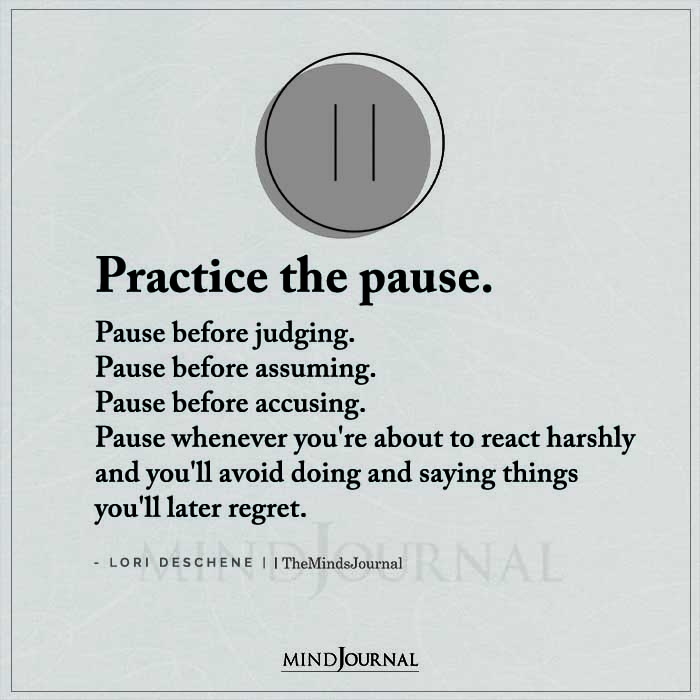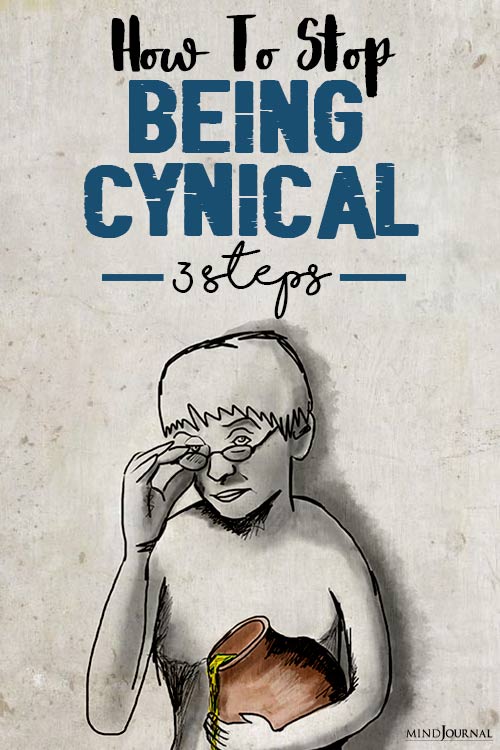Do you react sarcastically to most questions? Do you like to keep things “real”? Then you just might be a cynical person. Although you may not realize that you are cynical, it is affecting your life negatively. That’s why you need to learn how to stop being cynical.
I have been called a cynical jerk several times in my life thanks to my sarcastic comments, grumpy temper and disappointed views on modern life. But I admit I tend to give more credence to the negative aspects of a situation, more than the brighter side of life. Fortunately, I realized how my cynicism was affecting my life and finally decided to stop being so cynical.
I admit some level of cynicism is required at a certain level for our self-esteem and survival, but chronic cynicism can be damaging for both our mental and physical health. This is why we need to address our cynical attitude and learn about the steps to stop being cynical.
What does cynical mean?

Associated with the ancient Greek philosophers known as the Cynics, cynicism is an attitude where someone believes that most people are typically driven by their own self-interest, instead of being motivated by unselfish factors or reasons. Modern day cynics tend to distrust the motives and intentions of other people and believe people are generally insincere.
“Cynicism reflects a negative appraisal of human nature, a belief that self-interest is the ultimate motive behind all human actions, even the seemingly good ones, and that people will go to any lengths to satisfy it,” explains a 2019 study. A cynical person believes that everyone tends to act selfishly all the time as they are only interested in their own personal gains. Cynics also have a pessimistic view of the world and hence, find it difficult to trust people who are driven by ambition, goals, pleasure, desire, materialism etc.
Related: What Is Cynicism?
But what makes a person so cynical?
I have often wondered “why am I so cynical?” and I realized that cynicism is often born out of unrealistic expectations from other people, our community and the authorities. Unmet expectations can result in disillusionment which leads to negative feelings like disappointment, bitterness & resentment. It is often triggered when we feel angry, hurt or betrayed and instead of coping with these emotions in a healthy manner, we let these emotions distort our perspective and beliefs. Someone can also become a cynical person if they feel extremely burnt out. “The experience of cynicism may be more of a core part of burnout than exhaustion,” explains a 2016 study.
We may develop a cynical attitude towards a particular situation or a specific person initially, but eventually it dominates our mindset and we look at everything the same negative way. And this mental attitude slowly makes us more stressed, depressed and hostile leading to lower social support and higher interpersonal conflicts. Studies have found that cynicism can lead to hostility, aggression, anger, anxiety, stress, depression and even suicidal ideation. And this is why you should learn how to stop being cynical if you think you have cynical personality traits.

Related: How To Prevent Burnout: 13 Signs You’re On The Edge
But before you can learn about the steps to stop being cynical, you need to first understand whether you are cynical or if you have just a healthy dose of pessimism.
Are you cynical?
Here are some of the most common signs you are cynical or have started become a cynical person –
- You become easily annoyed by people who are overly optimistic or motivated
- You use sarcasm as your primary tone for communicating with others
- You think people who praise or compliment you are lying or being patronizing
- You question what others tell you, including the media
- You believe that others are being nice to you because they want to exploit or at least use you
- You have a general pessimistic outlook and avoid romanticizing life
- You always look for the things that can go wrong and prepare for the worst case scenario
- You always believe that everyone has an ulterior or hidden motive

So, are you a cynic? If yes, then here’s what you need to do next.
Related: The Damaging Effects Of Negativity On Your Health
Steps to stop being cynical
If you are a cynical person and want to shift your mindset and attitude towards a more optimistic and less sarcastic direction, then here are a few tips to stop being cynical all the time –
1. Acknowledge your cynicism
Accepting the fact that you have become too cynical for your own good is the first step to overcoming your cynicism. Once you admit that your attitude is holding you back, it will make it easier for you to put in the effort to let go of your negative mindset and develop a more optimistic outlook. Try to observe your negative attitude when you interact with others as self-awareness can help us gain more emotional control. Studies have found that meta-awareness or self-awareness and mindfulness can help us better regulate our behavior (self-regulation) and develop prosocial behaviors.
So when you start to notice your thoughts, you will be better able to change your cynic attitude.
Related: 6 Ways to Practice Self Curiosity and Become More Self Aware
2. Develop positive thinking
Yes, it’s easier said than done, especially when you are a cynical person. But if you want to learn how to stop being cynical and take steps to change your attitude, then this part is absolutely crucial. To a cynic, optimism may seem illogical and immature. However, you need to realize optimism has several benefits and rewards that can transform your life, such as –
- Better physical and mental health
- Longevity and longer life
- Fewer illnesses and diseases
- Better emotional control
- Healthier relationships
- Increased performance and productivity at work
- Improved resilience
- Enhanced ability to succeed
However, as a cynic, you may find it really difficult to let go of your old mental tendencies to be pessimistic and switch it with optimism. So here are a few ways to develop a more positive mindset –
- Replace negative thoughts with positive messages and affirmations that you can repeat to yourself every day.
- Set small goals and focus on how you can achieve them instead of focusing on others’ pursuing their goals.
- When in a difficult situation, take account of the negative outcomes but keep your focus on the positives. There is always a silver lining which can teach you a lot.
- Avoid thinking too much about the future, whether it’s about your work, relationships or goals.
- Avoid thinking about past failures and negative experiences as well. The past is already gone. Nothing good can come by living in the past.
- Be more mindful and bring your attention to the present moment as it is all you truly have.
- Practice gratitude and be thankful for what you have. Write down 3 things you are thankful for each day.
- Spend more time with people who are optimistic. Instead of judging them, observe their thought patterns in different situations. And make sure to avoid other pessimists and cynics.
- Challenge your negative thoughts and question yourself about the validity of such thoughts. Don’t allow your cynicism to distort your thoughts.
- Be more solution-focused instead of being problem-focused.
Related: 11 Positive Thoughts For Your Everyday Motivation
3. Pause, breathe & relax
Instead of trying to stay constantly busy to avoid coping with your negative mindset, pause for a moment and simply focus on your breath. That’s how to stop being cynical. Being busy is not a reason or a solution to being a cynical person. It has been observed that cynics are prone to breathlessness as they hold their breaths frequently. Although this is not a deliberate act, this instinctive defensive response can affect their ability to relax and observe their thoughts.

Practicing breathwork or breathing exercises, along with relaxation techniques like mindfulness meditation and yoga, can help you breathe deeply and relax your mind. Alternatively, you can simply pause the moment you realize negative thoughts are creeping in, take a walk outside and breathe slowly and deeply. This can help you to relieve stress and calm your mind. Pausing and breathing can help you restructure your thought patterns.
Related: 7 Steps To Meditate for Brain Health, Mental Fitness, and Energy
How to stop being cynical

Apart from the crucial strategies mentioned above, here are some other things you should know about when trying to figure out how to stop being cynical –
1. Avoid giving much importance to negative information & experiences as it validates pessimism and leads to negative feedback loop.
2. Observe and prevent cynical thoughts the moment they occur so that they do not influence how you think and behave.
3. Address your past trauma, fears and insecurities as these can cause emotional pain and suffering and fuel your cynicism.
4. Restrict your consumption of news, social media and other forms of media that can affect your mindset and lead to a negative attitude.
5. Spend more time in nature and get exposure to sunlight, by taking a walk in your local park or going for a hike, as it can imbibe positivity and make you feel better.
6. Do things you enjoy and be more playful. Be curious, explore new interests and hobbies, practice art, play sports, watch movies and listen to music.
7. Instead of judging everyone, try to consciously look at their best qualities and positive aspects.
8. Practice loving-kindness, be more empathic and compassionate and ground yourself to reduce stress and anxiety.
9. Seek help and support from loved ones and seek medical help from a therapist, if needed.
These steps mentioned above, this is how to stop being cynical and be more optimistic in life.
Related: Chronic Negativity: How it Poisons Your Mind, Body, and Soul
Replace cynicism with optimism

Most of us go through negative experiences like loss, grief, abuse and trauma. And for some of us being a cynical person helps us to cope with our inner issues and make sense of life. Our cynicism helps us feel like we have some control over ourselves and our lives. However, being a cynic can be detrimental for our mental and physical health and can hold us back in life. Our negative attitude can keep us trapped in our insecurities and make us constantly feel unhappy.
However, changing our mindset and attitude to adopt a more positive approach can help us bring a positive change in our career, relationships and life. Follow the strategies and tactics mentioned here to step out of the vicious cycle of cynicism and watch how your life transforms all for the better.
Don’t allow cynicism define you. Welcome positivity and let happiness in.
Related: How To Shift Your Mindset Towards More Optimism and Happiness
Frequently Asked Questions (FAQs):
What is the root cause of cynicism?
Our personality is one of the primary reasons why we may become a cynic. Moreover, adverse life experiences, insecurities, fear and having a pessimistic nature can also lead to cynicism. It is basically a survival and evolutionary instinct.
Is cynicism a toxic personality trait?
Cynicism can be a toxic personality trait if you are unable to control your anger, aggression, mistrust and hostility. If your cynic attitude negatively affects others’ emotional and mental health then it is toxic.











Leave a Reply